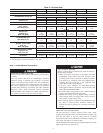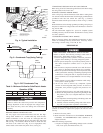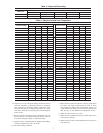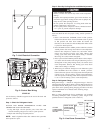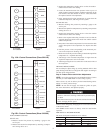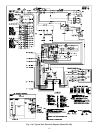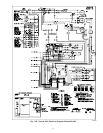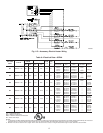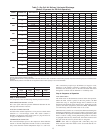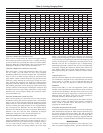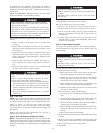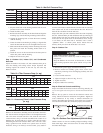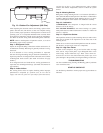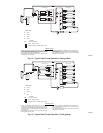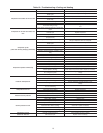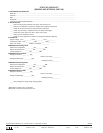
be performed on this equipment. This cooling unit should be
inspected at least once each year by a qualified service person. To
troubleshoot cooling of units, refer to Troubleshooting chart in
back of book.
NOTE TO EQUIPMENT OWNER: Consult your local dealer
about the availability of a maintenance contract.
FIRE, EXPLOSION, ELECTRICAL SHOCK HAZARD
Failure to follow this warning could result in personal injury,
death or property damage.
The ability to properly perform maintenance on this equip-
ment requires certain expertise, mechanical skills, tools and
equipment. If you do not possess these, do not attempt to
perform any maintenance on this equipment, other than those
procedures recommended in the User’s Manual.
The minimum maintenance requirements for this equipment are as
follows:
1. Inspect air filter(s) each month. Clean or replace when
necessary.
2. Inspect indoor coil, outdoor coil, drain pan, and condensate
drain each cooling and heating season for cleanliness. Clean
when necessary.
3. Inspect blower motor and wheel for cleanliness each cooling
and heating season. Clean when necessary. For first heating
season, inspect blower wheel bimonthly to determine proper
cleaning frequency.
4. Check electrical connections for tightness and controls for
proper operation each cooling season. Service when neces-
sary.
5. Check the drain channel in the top cover periodically for
blockage (leaves, insects). Clean as needed.
FIRE, EXPLOSION, ELECTRICAL SHOCK, CUT HAZ-
ARD
Failure to follow these warnings could result in serious
personal injury, death, and/or property damage:
1. Turn off electrical power to the unit and install lockout tag
before performing any maintenance or service on the unit.
2. Use extreme caution when removing panels and parts. As
with any mechanical equipment, personal injury can result
from sharp edges, etc.
3. Never place anything combustible either on, or in contact
with, the unit.
Step 1—Air Filter
NOTE: Never operate the unit without a suitable air filter in the
return-air duct system. Always replace the filter with the same size
as originally installed. See Table 2 for recommended filter sizes.
Inspect air filter(s) at least once each month and replace
(throwaway-type) or clean (cleanable-type) at least twice during
each cooling season or whenever the filters become clogged with
dust and lint.
Replace filters with the same dimensional size and type as
originally provided, when necessary.
Step 2—Unit Top Removal (Outdoor-Coil Side)
NOTE: When performing maintenance or service procedures that
require removal of the unit top, be sure to perform all of the routine
maintenance procedures that require top removal, including coil
inspection and cleaning, and condensate drain pan inspection and
cleaning.
ELECTRICAL SHOCK HAZARD
Failure to follow this warning could result in personal injury
or death.
Disconnect and tag electrical power to the unit before
removing top.
Only qualified service personnel should perform maintenance and
service procedures that require unit top removal.
Refer to the following top removal procedures:
1. Remove screws on unit top cover surface. (Save all screws.)
2. Remove screws on unit top cover flange. (Save all screws.)
3. Lift top from unit carefully. Set top on edge and make sure
that top is supported by unit side that is opposite duct (or
plenum) side.
4. Carefully replace and secure unit top to unit, using screws
removed in Steps 1 and 2, when maintenance and/or service
procedures are completed.
Step 3—Indoor Blower and Motor
For longer life, operating economy, and continuing efficiency,
clean accumulated dirt and grease from the blower wheel and
motor annually.
ELECTRICAL SHOCK HAZARD
Failure to follow this warning could result in personal injury
or death.
Disconnect and tag electrical power to the unit before
cleaning the blower wheel.
To clean the blower wheel follow the following steps:
1. Remove the blower housing:
a. Remove the screws on the external side of the duct panel
that fasten the housing to the duct panel assembly.
b. Remove the side access panel and unscrew the mounting
bracket that fastens the blower housing to the internal
partition panel fo the control box assembly.
c. Make sure that the blower housing is supported by hand
before completely removing the mounting bracket.
d. Slide the blower housing from the rails of the duct panel
and place it outside the unit.
2. Remove the blower wheel from the housing:
a. Loosen the set screw which secures the wheel to the motor
shaft.
b. Loosen the three mounting legs of the motor by removing
the bolts that fasten themounting legs to the housing.
c. Slide out the motor assembly (motor, belly band and the 3
mounting legs) from the hub of the wheel.
d. Remove the filler panel at the discharge end of the blower
housing by removing the two screws that fasten it to the
housing.
e. Remove the wheel form the housing.
3. Remove the caked on dirt from the wheel and the motor using
a brush.
4. Remove lint and dirt accumulations from the wheel and
housing with a vacuum cleaner, using a soft brush attachment.
5. Remove grease and oil with a mild solvent.
6. Reassemble
15



